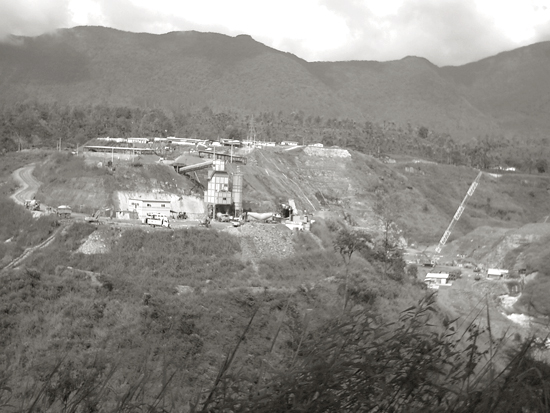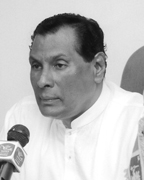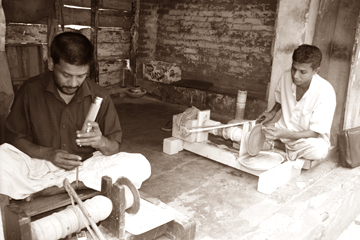|
Constitutional changes vital:
Two-thirds majority assured for UPFA Govt-Minister Seneviratne
by Amal HEWAVISSENTI
|

Projects such as Upper Kotmale have been launched to provide
electricity to a larger part of the population
|
|

Minister of Power and Energy W. D. J. Seneviratne |
W.D.J. Seneviratne is the Minister of Power and Energy, the former
Member of Parliament for Ratnapura district, and the district leader for
Ratnapura. He has transformed the traditional political landscape of
Ratnapura by introducing a trend for a new political culture that set an
example for many others to follow.
Moreover, he is noted for having made judgements based on a broadly
focused vision of the political ethos of the country. The following are
some of the excerpts of the interview the Sunday Observer had with him:
Q: The trend of lawyers joining the political mainstream is not new.
You too are not an exception. Can you briefly outline your background
and education? How did your background help sharpen you into what you
are today?
A: Honestly speaking, I had a certain type of political background in
my home. So, from childhood, I was exposed to the realities which
provided and developed a political insight in me. I received my early
education at Gankanda Maha Vidyalaya, Pelmadulla. I must tell you that
my first school paved the way for my success. Then I entered Thakshila
Maha Vidyalaya for my O/Levels in the English medium. After successful
completion of my O/Levels, I entered Aquinas University College to
pursue my higher studies. While I was at Aquinas University College, I
got an appointment as a teacher of English at a government school.
Q: That seems to have been a significant turnaround in your life. How
far did it imprint your later moves?
A: Well, yes. While I was at Aquinas University College, I was
teaching English at a government school for a short time. This was a
novel experience for me. It is here that I got the basic inspiration for
developing education in the country. While there I saw the hardships
that rural children faced without the basic infrastructure. Meanwhile, I
managed to enter Law College. I passed out as an advocate and started
practising in my hometown, Ratnapura.
Political breakthrough
Q: Your education in the field of law must have contributed much to
develop your flair for politics. How did you make your political
breakthrough?
A: While I was practising as a lawyer, I became interested in active
politics. Earlier, when I was studying at Horana Thakshila, I actively
participated in student organisations. This gave me considerable drive
to move forward in politics. I contested the 1989 general election from
Ratnapura.
As I told you earlier, from childhood, I was extremely interested in
becoming a politician. At the same time I was resolved to become a
lawyer by enrolling at Law College. My father, being a village
politician, who was the Vice Chairman for Pelmadulla Gamsabha, inspired
me much with his political thinking.
|

Standards of the gem industry will be uplifted |
At the same time, I was involved in social work and politics
throughout the district. Thus, my involvement in social work and
political activity earned me a considerable degree of popularity. In
1989, I contested the general election from Ratnapura. By this time, I
had a certain degree of experience through my work as an organiser for
the Pelmadulla and Nivithigala seats.
Q: You contested the general election under highly unfavourable
conditions for the Sri Lanka Freedom Party. How did you overcome the
challenges?
A: Yes, I contested the election during the violent period. However,
I emerged second in the list. Second in position to Nanda Ellawala, a
powerful political figure who fought the principles of the then UNP
government tooth and nail.
Even while I was in the Opposition, I did my level best to upgrade
the living conditions of people. I made a lot of effort to provide
infrastructure within the district. With the Rs. 2.5 million allocated
to me by the government, I had to deal with the challenging task of
launching development projects especially in rural areas. Meanwhile, I
managed to get more funds from the then national list MP, S.E.B. Perera.
President R. Premadasa commended me for providing electricity to rural
areas which had extremely poor facilities at that time. This way, I was
able to provide vital infrastructure to the rural areas though we, as
the Opposition, were completely out of funds.
Historic government
Q: This was the first landmark in your political career. With the
landslide victory of the People's Alliance in 1994, what was your
functional role in the subsequent government?
A: We made our historic government in 1994. I became the Deputy
Minister of Education and did much to uplift the educational standard in
the country. After that I became the Minister of Labour. Under this
ministerial post I was able to fight the unemployment problem which is a
major barrier to development. I also inaugurated a fundamental agreement
to be signed by the employer and employee.
Q: Could you further elaborate on your role in helping solve the
unemployment problem? How did you minimise the vast gap between employer
and employee?
A: As you can see, the employee or unemployed often have to pursue
the employer. However qualified the employee is, the employer decides
everything. Under my new concept, this process has been reversed. I have
created more career opportunities in which the employer is forced to go
after employees. That is the basic difference.
Apart from that, I'm proud to say that I have sent a higher number of
people to the Middle East as housemaids. This is a giant step forward in
fighting the unemployment problem. Earlier, there were many unfortunate
incidents regarding housemaids. Most often they were brutally harassed,
injured, assaulted and even murdered by their employers in the Middle
East. Sri Lankans employed in the Middle East faced many problems. I
took measures to prevent this dangerous and pathetic situation. I took
every precaution possible against such situations. I also ensured that
they receive enough funds. I introduced a welfare system for those
people.
Q: What type of intervention did you make to minimise the tragedies
that involve Sri Lankan employees, specially domestic workers in the
Middle East?
A: As the Minister of Labour, I have taken steps to provide funds for
domestic workers. This was done through an agreement with the employers
of the foreign country. In this way, assistance is granted to those
domestic workers who are the victims of various unfortunate incidents
abroad. With the introduction of this welfare program, they are given
much relief. This is funded by the employers in foreign countries. I
have also sent a large number of youth to Korea for employment
opportunities.
Developing Ratnapura
Q: What plans come topmost on your agenda to develop the district?
A: Though Ratnapura is famous for gems, the majority of people here
are very poor. I hope to uplift the standard of the gem industry
further. Thereby we can create more employment opportunities. We must
make the most of the power and strengths of the youth towards the
country's development.
The educational and infrastructure level of the district is very
poor. From my tenure as the Deputy Minister of Education, I have
formulated policies to improve the educational standard of the people.
Measures have already been taken to redevelop the network of roads.
Under the concept of "Semata Viduliya", I have been able to supply
electricity to most of the extremely rural areas. As the Minister of
Power and Energy, I hope to provide electricity to at least 95 percent
of the population. When I became the Minister of Power and Energy,
electricity was available to only 50 percent of the population. But now
the electricity consumption has risen to 75 percent of the population.
Now my plan is to provide electricity to 90 - 95 percent of the
population within a short period of time.
Q: What do you think about the possibility of the UPFA government
securing a two-thirds majority at the upcoming general election?
A: Though we as the UPFA government have always secured a large
majority of votes, only six members out of ten have been elected under
the current electoral system. This happens under the PR system. With the
current enthusiasm, political upheavals and the encouragement received
from Provincial Council victories, I am highly confident that the UPFA
government will easily secure a two-thirds majority. I think seven out
of our ten members will get elected. People will give a clear mandate to
our President to make vital changes to remove the barriers for
development.
Q: There is a common tendency among members of the same party to
fight for preferential votes. This is a highly detrimental trend which
was even criticised by President Mahinda Rajapaksa. How is the electoral
atmosphere prevailing in your district?
A: This is perfectly true. The Proportional Representation system has
led to split-ups in political parties, bringing about unending trouble
within parties. Under this electoral system, such conflicts are
inevitable. But a perfectly calm atmosphere is being maintained as far
as election campaigns are concerned. There is no problem at all between
me and my fellow candidates regarding who wins the largest number of
preferential votes. We have a mutual understanding about how the
election machinery works.
Now that the Opposition is totally ineffective and lethargic we do
not have any doubts regarding the electoral victory of the UPFA.
However, I'm of the strong view that competitions, or struggles for
preferential votes within the same party must be kept at a minimal
level. Otherwise, these conflicts will make the record-breaking victory
of the UPFA unimportant and invalid. We must extend our collective
strength to our President and contribute our share to make Sri Lanka the
Wonder of Asia as the Mahinda Chinthana spells out.
Development projects
Q: How do you view the government's plans following the general
election?
A: With the two thirds majority in hand, the government will
definitely launch massive development projects. The Mahinda Chinthana -
2010 The Vision Ahead will be our ideal archetype in this venture.
President Rajapaksa has defined the full development scope in his
concepts. The President has been unprecedentedly strengthened by the
people during the presidential election. Now he wants a strong and
effective Cabinet to assist him in his mission to make Sri Lanka the
wonder of Asia.
The government is of the strong resolution that Constitutional
changes must be brought about to abolish the current electoral system.
The preferential voting system creates antipathy and hostility among the
candidates of the same party. Apart from that the government is
considering changes to the Local Government and Provincial Council
system.
Q: What is your message to the voters?
A: Well .... We are now enjoying perfect freedom and a peaceful
atmosphere because President Rajapaksa ended the war. The people gave
him a clear mandate for that. I ask the UNPers to join the political
current of the country. Then they can contribute their share to the
overall development of the country. |

